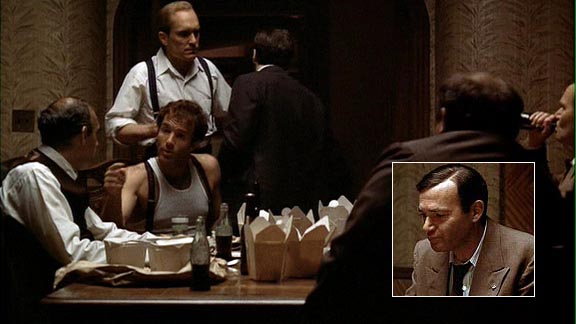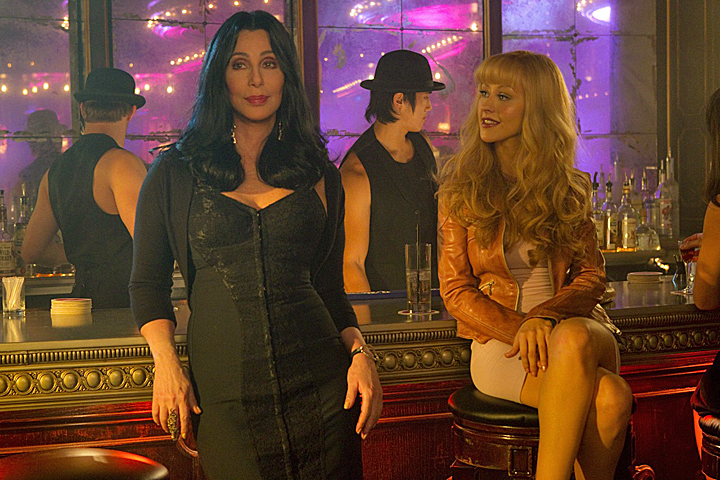Q. In the Answer Man for Aug. 17, Phil Giordano asks about a Sixth Man in “The Godfather” who is never identified when the Corleones plan the execution of a police captain. The person he is wondering about is Rocco Lampone, played by Tom Rosqui, who is uncredited in the film, according to the IMDB. Mr. Giordano will remember the earlier scene in the film where Rocco executes Paulie in the car as Clemenza urinates outside (the “leave the gun, take the cannoli” scene).
According to the book, this is where Rocco finally makes his bones. He sits in on the meeting as the family waits for news from Sonny’s contact at McCluskey’s police station to find out where Michael’s meeting with Sollozzo will take place. This shows the trust he has earned from the family. He eventually becomes one of Michael’s two caporegimes (Al Neri is the other one). Incidentally, it is Rocco who, in the second film, assassinates Hyman Roth at the airport, only to be shot in the back by a police officer as he tries to flee the scene.
Ali Arikan, Istanbul, Turkey
A. I received a lot of solutions to the question, only three persuasive — yours came in first, followed by John Fitzpatrick of Springfield, Ill., and Jorge Gamboa of Tucson, Ariz. Some of the other answers refer to an earlier scene discussing the wisdom of the killings. The Sixth Man scene begins at about 1:18:12 and continues until about 1:18:52; it’s the man on the far right, drinking from a bottle of beer.
Q. Where are all the Hollywood he-men with deep-chested voices such as Peck, Gable, Heston and Wayne? They were replaced by the baritoned smoothies such as Newman and Redford and now we have the soprano-voiced teeny-boppers such as DiCaprio and Pitt, who are laughable as heroes. Your opinion?
Del Lashbrook, Durham, Ore.
A. Not laughable, and gifted actors.
But just on the basis of the actors in three movies I saw on one day last week, I would suggest that deep voices endure, as represented by Morgan Freeman, George Clooney, Tom Wilkinson, Sydney Pollack, Russell Crowe, Christian Bale, Peter Fonda and Fred Ward.
Q. I was on the Web one late, lonely evening reading the works of Mark Twain. I found his essay, “Fenimore Cooper’s Literary Offenses” and immediately thought of you. I was wondering what your thoughts were after reading that?
Jacob Henderson, Eugene, Ore.
A. Oddly enough, that essay, which I came across in grade school, may have had a greater influence on my critical style (in certain moods) than any other single thing I’ve read. Mark Twain can make me laugh out loud, as in “The Innocents Abroad,” where an Egyptian guide shows a tour group a mummy that is 3,000 years old. An American tourist says: “How calm he is — how self-possessed. Is, ah — is he dead?”
Q. I was glad to read your take on “Casino Royale” (2007). But I have a question. The villain was a terrorism financier (who bled out of his eyes, but that’s irrelevant). At the end, Bond begins to go after the terrorist organization. Are they setting this up for SPECTRE?
Ari Lewis, Charlotte, N.C.
A. A tantalizing possibility. Health tip: If you start to bleed out of your eyes, it’s not irrelevant.
Q. Was the mission in “Sunshine” a “kamikaze” mission, as you say? The characters talk about “getting home,” but I don’t understand how that is possible if they are meant to jettison their big front shield thingy into the sun to deliver their bomb.
Gordon Barnard, West Hollywood, Calif.
A. Neither do I. If you’re going to fly inside Mercury’s orbit and hurl a bomb into the sun to burst its Q-ball (non-topological soliton) into pieces, I suggest that “home” may require a theological definition.
Q. I recently saw John Cassavetes’ “The Killing of a Chinese Bookie,” and was amazed at how good it was. Afterward I thought how much more Cassavetes might have been appreciated by the general public if the production values on his films had been higher. Why was he unable to get more money for his films? Was it simply a matter of choosing artistic freedom? As an actor, he must have had good connections within Hollywood.
Tony Diaz, Austin, Texas
A. The improvised look of his films is the heart and soul of the spontaneous effect, and allowed him to make exactly the films he wanted to. It’s doubtful the general public would have embraced him even if he’d shot in 3-D IMAX.
Q. In some of the advertising for “Rush Hour 3,” Jackie Chan has top billing. In some, Chris Tucker has top billing, and in some, Jackie Chan doesn’t even appear to be in the movie. How often does the billing for a movie change based upon the specific marketing campaign?
Harold Hedrick, Silver Spring, Md.
A. This was probably dictated by the demographic target of each ad. (1) Jackie top billing: martial arts fans. (2) Both equal: “Rush Hour” fans. (3) Tucker only: a waste of money, if they think African-American audiences don’t know and like Jackie Chan.
Q. In more than one review now, you have cited the slogan of your favorite restaurant chain, Steak ’n Shake, which reads, “In Sight, It Must Be Right.” After years of puzzling, I still have no idea what that means.
Michael Miller, Clinton, Conn.
A. If you can see ’em fryin’ the burgers right there behind the counter, you know there ain’t no funny stuff goin’ on in the kitchen. This concept of the visible kitchen, introduced in 1934 by S&S founder A.H. (Gus) Belt, was copied decades later by Wolfgang Puck, etc. It is my belief that the motto applies not only to food, but to politics, auto repairs, fresh fish, the cinema, etc.
Q. I was reading your Great Movie review of “The Good, the Bad and the Ugly,” and at the end you referred to Sergio Leone’s “Once Upon a Time in the West” as an unquestionable masterpiece, but your 1969 review gave the film 2 stars. Are you ever tempted to go back to old reviews in a “what was I thinking?” sense.
Matthew Tillden, Amherst, Mass.
A. I don’t do revisionism, except to correct factual errors. The point of an old review is to reflect how I was thinking at the time. Not very well, in this case.
Q. It appears that you have a problem with “the fifth.” In every great series, it appears that when they get to the fifth film, you are always let down. Such is the case with “Star Trek V,” “Harry Potter and the Order of the Phoenix,” “Star Wars: Episode II” (the fifth “Star Wars” film made), etc. This is in spite of your appreciation of every other installment of the series. Is this coincidence or do you have something against the number 5?
Samuel Mils, Salt Lake City
A. I plead the fifth.
Q. Your reviews for “The Departed” and “Casino Royale” leave me intrigued. Are you going to write any more reviews from movies that opened while you were ill? Is there any film you would single out as being the best of 2006?
Greg Packnett, Madison, Wis.
A. I’ll be going back to catch up on certain movies I missed. Today I revisit “Zodiac,” and the Great Movie this Sunday will be “Pan’s Labyrinth.” Eventually I’ll come up with a Best 10 of 2006, with an asterisk.
Q. Whenever a character immobilizes someone who tried to kill him (or her), the first question is always: “Who sent you?” No one ever assumes that murderers act on their own initiative.
Alberto Diamante, Toronto
A. I wish a character would use the late Mayor Richard J. Daley’s classic line. He once asked a visitor looking for a job, “Who sent you?” The visitor said, “Nobody.” Daley replied: “We don’t want nobody nobody sent.”












